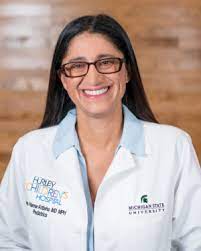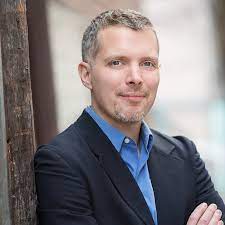Rx Kids Aims to Lift Up the Children and Families of Flint
Thanks to a $15 million “challenge” grant from the Charles Stewart Mott Foundation, families with young children in Flint, Mich. could soon benefit from an innovative program that tackles a root cause of health disparities—poverty. Rx Kids would be the first citywide program in the United States to address maternal and infant poverty with the novel approach of unconditional cash allowances to all pregnant moms and babies in the city of Flint. Two of the initiatives leaders—Mona Hanna-Attisha, pediatrician and director of the Michigan State University-Hurley Children’s Hospital Pediatric Public Health Initiative, and Luke Shaefer, Hermann and Amalie Kohn Professor of Social Justice and Social Policy at the University of Michigan, spoke to Spotlight recently about the program. The transcript of that conversation has been lightly edited for length and clarity.
Why don’t we start with how this idea came about?
Hanna-Attisha: For a long time, as a practicing pediatrician, I wished that I had the ability to prescribe away poverty, as so many of the ailments of the children that I care for are in part due to the overwhelming poverty that they are born into and grow up in. So, I think for a long time I’ve kind of shrugged my shoulders, feeling like, what can we do about poverty? This is a really big, kind of systemic issue. How are we going to fix that? And in Flint, we do a lot of awesome things for our kids. I prescribe fruit and vegetable prescriptions. We give books to kids, and I have a social worker in my clinic, and we try to wrap our kids and families with goodness to promote their health. But I’m also just tired of band aids; a lot of what we do is reactive and doesn’t get at the root of problem.
So, last year, I said, hey, I want to do a child allowance. We saw the wild success of the Child Tax Credit. This is wildly successful in so many other countries. You know, let’s do this in Flint. And so, I called Luke, and said, hey, you don’t know me, but you’re this awesome poverty scholar and would you be interested in working on a child allowance project in Flint? That’s kind of how we got connected and we’ve been working together now for almost a year in partnership with our community. I have a group of parents that advise me and a group of kids that advise me in Flint and this has been kind of percolating as a concern—the everyday struggles with hardship and making ends meet. I also run something called the Flint Registry, which is a CDC-funded project that’s doing population level surveillance and support, and hardship is a big issue there as well. So rather than just observing it and reporting on it, we’re hoping to do something.
Luke, before you talk about how you got connected to this work, you’re obviously very familiar with similar types of projects. How is this one different?
Shaefer: Bill, as you know, I got to play a role in making the case for the expanded Child Tax Credit. And that was based on the work that so many of us have done that shows in country after country, when child benefits roll out, child poverty falls and food hardship falls, and kids do better. We saw that again in 2021, as child poverty and food hardship fell to all-time lows. We were able to prove what we can do as a country and the dramatic results we can have when we take a different approach to our safety net. And it also was incredibly sad to see that we were at this crossroads, and we could have extended it and we decided not to.
So, that has left me wondering what the next steps are. There’s lots of small pilots going on around basic income, and I think it’s really important to differentiate where we are in terms of the evidence base. I think guaranteed basic income is a really important idea for us to be talking about and a great thing to be piloting. But child allowances or child benefits is just in a fundamentally different place, like we’ve seen in country after country, and we’ve seen it work here. I really think of it as the evidence-based policy of evidence-based policies. So, what really excited me when Mona called was that what she wanted to do was not another pilot that was going pick a hundred or winners to test us out and see what happens. I think there’s a lot of important types of pilots going on right now; some of them are focused on kids, but most are not. But I think in the child allowance space, it’s time for evolution. And I think the evolution of that work is to do something citywide and be able to really show the impact of what happens to a place.
Flint is one of the very poor cities in the country. It’s the poorest city in Michigan. Child poverty rates are three times above the national average. The scale is what really excited me, and I’ve been saying no to being a part of a lot of pilots. The other thing that really excited me was the connection to health. For RxKids, there’s going to be lots of doorways in, but the primary doorway in is going to be through your healthcare provider and your prenatal doctor’s appointment. I think this connection to health can be really powerful.
Mona, can you walk us through how this would work?
Hanna-Attisha: RX Kids is designed as a prenatal and infant allowance. Moms in pregnancy would get a one-time prenatal allowance of $1,500. It’s designed to be in mid-pregnancy, around 20-weeks’ gestation, really building on several pilots that show the greatest impact around mid-pregnancy for metrics like birth weight. They would be prescribed this by their obstetrician, and we hope that act pushes people to their prenatal visits sooner. I think that’s one of the first metrics that we’ll see change. And then once the baby’s born, there will be a monthly $500 unconditional cash allowance until 12 months of age. So, it is just really focused on this narrow window of pregnancy and infancy.
Now, obviously, Luke and I would love to do this until 18 years age, like so many other countries. But if you had to pick like a moment in the life of a child that is so critical and foundational for their development, it is this prenatal infancy window. And most tragically, this is the same window where poverty spikes. Moms lose income, babies need expensive stuff, childcare is expensive, and parental leave policies aren’t very good. And as a pediatrician, that’s maddening because once again, this is the most important period in a child’s life.
And it’s universal, correct?
Everybody—no means testing. And—Luke please jump in—but I think this is critical to this program because this is not about having a certain income. This is about society saying, we support you. We know that having a kid and raising a kid is difficult and we are here walking alongside you. This is not just cash; this is really kind of a rebuilding of that social contract between institutions and government and the most vulnerable.
And Luke, that’s a difference from some of the other pilots, right? Some of which are means tested.
Shaefer: That’s right. And I think it’s building on more and more research that’s coming out that suggests money is important and money empowers families to spend on the needs that they see as being greatest. And they know a lot more about what’s going on in their lives and what they need than government does, or philanthropy does. But there’s also this matter of the messaging. I think there’s more and more evidence coming out that how you frame the benefits matters a great deal. And there’s a lot of interesting things that show up sometimes when you make things universal. Actually, the take-up among those who needed it the most goes up even though they would’ve been eligible if it was a means-tested program. And by making it universal, we reduce the stigma. The messaging that Mona just laid out is so important—raising kids is expensive if you have no money or if you’re solidly middle class and we’re going to come alongside as a nation and be a part of that really hard work of parenting.
Mona, you mentioned prenatal visits. What are some of the other metrics that you’ll be watching closely in this process?
Hanna-Attisha: We’re going to be looking at hardship measures, both self-reported and from administrative data. We’re going to be looking at those maternal infant health measures like maternal morbidity and mortality and infant mortality and prematurity and low birth weight and breastfeeding initiation. We’ll also track infant health metrics, like well child visit attendance, immunization rates, screening rates, and developmental screenings. We’re also going to be looking at parents in terms of their health, their stress, their substance use. We’re also measuring some really cool outcomes like happiness and hope and dignity and trust in government and institutions. And I think I’m most excited about some of the community-level measures, which is what’s so novel once again about this program because it’s citywide. We’re going to look at, for example, what happens to the population of our city. Do less people move out? Do some people move in? What happens to violence and gun violence and neighborhood safety? What happens to civic engagement and democracy and voting? We feel that this is going to engage people in their communities and increase participation civic society. We also know that these dollars, $9 million a year, will probably be spent in the local economy. So, we’re going be looking at how those dollars flow.
Luke, are there any other metrics that you’ll be interested in looking at?
Shaefer: I think the thing that is most new to me as a social scientist, is that we often try to zero in on the one thing and neutralize everything else. In this case, we’re really thinking of the cash transfers as the starting point, the invitation to find deeper connections with healthcare providers and how much the taking of an action like this can impact the social fabric. It’s a new and different way of rolling out programs and I’m really just incredibly excited about it.
And this would begin next year?
Hanna-Attisha: Well, it all depends on our ability to raise the dollars. We got a $15 million grant from the Mott Foundation, but it’s a challenge grant. We need to raise another $15 million to unlock those funds. We need to raise about $55 million to do this for five years. We want to do this in perpetuity, but we’re trying to lay the pathway for sustainability and scalability with some other government sources.
Shaefer: I also wanted to mention that while the cash is a starting point, we’re also building an entire program of storytelling that will involve art and music. This is going to be celebratory and we’re really trying to leverage the arts and music to change the narrative of poverty. Hopefully that can influence policy more than anything we can do as scientists.
Mona Hanna-Attisha, pediatrician and director of the Michigan State University-Hurley Children’s Hospital Pediatric Public Health Initiative

Luke Shaefer, Hermann and Amalie Kohn Professor of Social Justice and Social Policy at the University of Michigan

